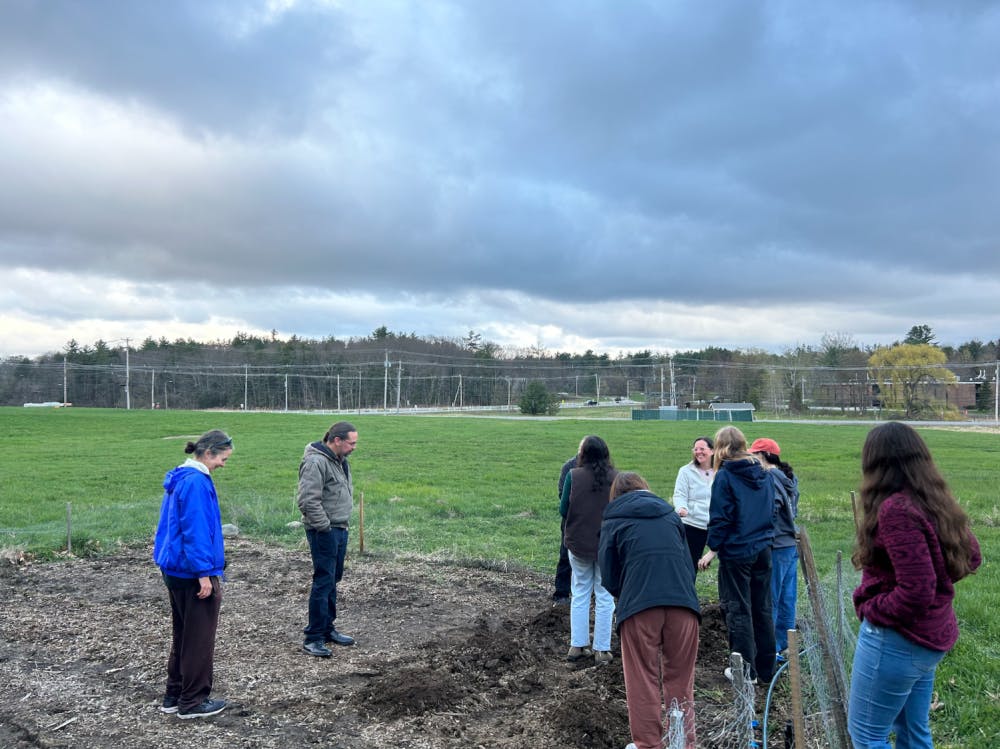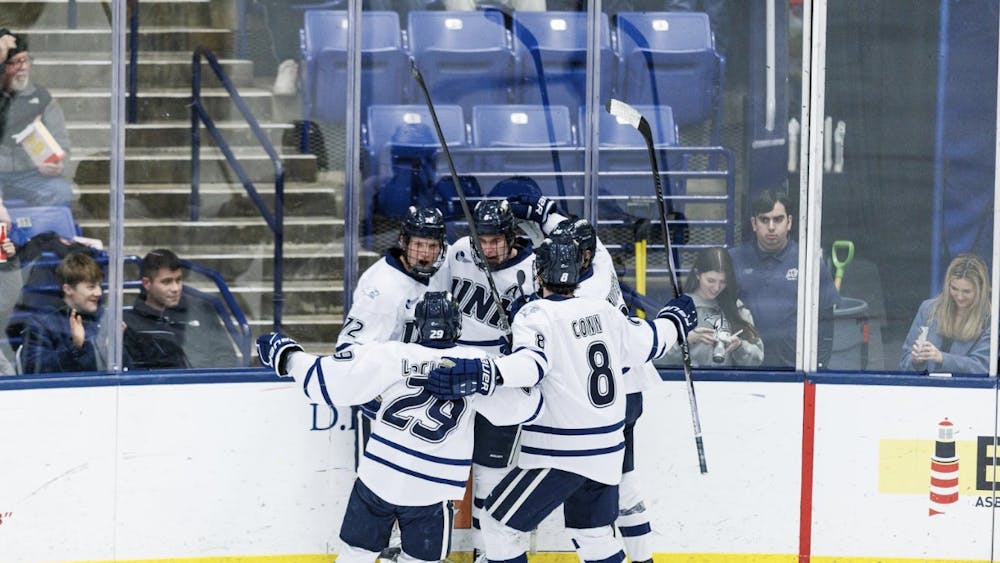DURHAM, NH- Located just off Durham’s Spinney Lane lies the University of New Hampshire’s (UNH) Organic Garden Club (OGC) Campus- Community Farm. Surrounded by raised beds and the smell of spring in the air, the club gathered at the quaint farm on April 25 to celebrate the opening of the new Indigenous Garden on campus. The event was complete with a ceremony lead by Paul and Denise Pouliot, head speakers of the Cowasuck Band of Pennacook-Abenaki People.
Isabel Cole, fourth-year sustainable agriculture and food systems major and vice president of the OGC, works with the Indigenous New Hampshire Collaborative Collective (INHCC) in addition to acting as an Interpreter at the Strawbery Banke Museum in Portsmouth, NH. Cole said that in collaboration with the two organizations, the Indigenous Garden has been a project they’ve wanted to launch for quite some time. This past spring they were finally able to make this ambition a reality with an INHCC grant.
The Indigenous Garden hosts a number of indigenous plants to New Hampshire, including Roy’s Calais Flint corn, Abenaki Rose Flint corn, True Red Wabanaki Cranberry beans, Abenaki Skunk beans, Delicata squash and Patty Pan squash. The Pouliots held a demonstration of planting Sunchoke artichoke seeds in one of the smaller enclosed beds in the center of the garden. Paul Pouliot explained that Sunchokes have a good content in Inulin, a dietary fiber found in plants that can aid in controlling diabetes.
Paul Pouliot mentioned during his demonstration that many local grocery stores carry Abenaki indigenous crops, but don’t attribute credit to where the crops are native from. Pouliot also highlighted that many local restaurants in Portsmouth purchase either the Roy’s Calais Flint corn or the Abenaki Rose Flint corn for produce in their restaurants.
Cole highlighted that the Abenaki Rose corn seeds came from Strawberry Banke, along with many of the other seeds of the indigenous plants that the club members have planted in the garden.
The various types of corn were planted in separate beds to avoid cross pollination. Cole outlined that corn has been in the area for about 2,000 years, resulting in a wide variety of indigenous NH corn.
At the opening of the Indigenous Garden, Paul and Denise Pouliot moved to the adjacent bed on the farm to plant the “three sisters,” consisting of corn, beans and squash. Cole highlighted that they are growing most of the “seven sisters,” an indigenous Abenaki agriculture practice. Part of this indigenous farming practice is to avoid monocropping, the practice of planting only one crop. Instead, indigenous farmers practice intercropping: they grow more than one plant on a plot of land to avoid wasting resources such as water and fertile dirt.
In the raised bed where Paul and Denise Pouliot held the honors of planting the Roy’s Calais Flint corn/ the Abenaki Rose Flint corn, the True Red Wabanaki Cranberry beans/ the Abenaki Skunk beans and the Delicata squash/ the Patty Pan squash, the seeds were planted all in one bed to reap the best harvest with each plant performing in a specialized way to support the other plant in the bed. The squash was planted on the bottom, corn on the top and the beans around the edge of the mounds. Cole and Paul Pouliot explained the strategic placement of each plant, highlighting that the beans planted around the edge of the mounds distribute nitrogen back into the soil, helping with water retention.
Cole highlighted that the OGC will donate the produce from the Indigenous Garden to the Waysmeet Center and hopes to engage further in education and community outreach.
“We wanted [the Indigenous Garden] to be educational and to feed the community,” she added.
Isabel Cole, fourth-year sustainable agriculture and food systems major and vice president of the OGC, works with the Indigenous New Hampshire Collaborative Collective (INHCC) in addition to acting as an Interpreter at the Strawbery Banke Museum in Portsmouth, NH. Cole said that in collaboration with the two organizations, the Indigenous Garden has been a project they’ve wanted to launch for quite some time. This past spring they were finally able to make this ambition a reality with an INHCC grant.
The Indigenous Garden hosts a number of indigenous plants to New Hampshire, including Roy’s Calais Flint corn, Abenaki Rose Flint corn, True Red Wabanaki Cranberry beans, Abenaki Skunk beans, Delicata squash and Patty Pan squash. The Pouliots held a demonstration of planting Sunchoke artichoke seeds in one of the smaller enclosed beds in the center of the garden. Paul Pouliot explained that Sunchokes have a good content in Inulin, a dietary fiber found in plants that can aid in controlling diabetes.
Paul Pouliot mentioned during his demonstration that many local grocery stores carry Abenaki indigenous crops, but don’t attribute credit to where the crops are native from. Pouliot also highlighted that many local restaurants in Portsmouth purchase either the Roy’s Calais Flint corn or the Abenaki Rose Flint corn for produce in their restaurants.
Cole highlighted that the Abenaki Rose corn seeds came from Strawberry Banke, along with many of the other seeds of the indigenous plants that the club members have planted in the garden.
The various types of corn were planted in separate beds to avoid cross pollination. Cole outlined that corn has been in the area for about 2,000 years, resulting in a wide variety of indigenous NH corn.
At the opening of the Indigenous Garden, Paul and Denise Pouliot moved to the adjacent bed on the farm to plant the “three sisters,” consisting of corn, beans and squash. Cole highlighted that they are growing most of the “seven sisters,” an indigenous Abenaki agriculture practice. Part of this indigenous farming practice is to avoid monocropping, the practice of planting only one crop. Instead, indigenous farmers practice intercropping: they grow more than one plant on a plot of land to avoid wasting resources such as water and fertile dirt.
In the raised bed where Paul and Denise Pouliot held the honors of planting the Roy’s Calais Flint corn/ the Abenaki Rose Flint corn, the True Red Wabanaki Cranberry beans/ the Abenaki Skunk beans and the Delicata squash/ the Patty Pan squash, the seeds were planted all in one bed to reap the best harvest with each plant performing in a specialized way to support the other plant in the bed. The squash was planted on the bottom, corn on the top and the beans around the edge of the mounds. Cole and Paul Pouliot explained the strategic placement of each plant, highlighting that the beans planted around the edge of the mounds distribute nitrogen back into the soil, helping with water retention.
Cole highlighted that the OGC will donate the produce from the Indigenous Garden to the Waysmeet Center and hopes to engage further in education and community outreach.
“We wanted [the Indigenous Garden] to be educational and to feed the community,” she added.













